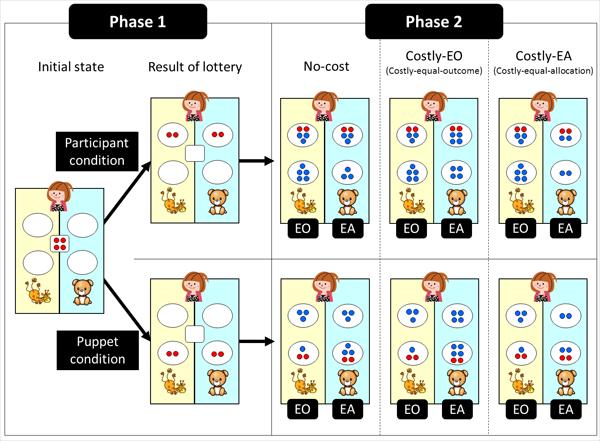
A Japanese study of 5- and 6-year-olds found that children prefer to share resources so that everyone ends up with the same amount (equal-outcome) rather than giving everyone the same amount regardless of what they have already (equal-allocation). This study was carried out by Associate Professor HAYASHI Hajimu of the Kobe University Graduate School of Human Development and Environment and the findings were published in the European Journal of Developmental Psychology on January 26, 2018.
How do we distribute our limited resources? This question is at the core of human society and ethics. Developmental psychology research has shown that around the age of 5 or 6, children come to prefer equal distribution over unfair distribution - even if this means they receive less. However, all participants in previous studies started with no resources, so it was unclear whether children preferred the even distribution of resources, or an equal outcome.
In this study, one party started with more resources than the other, with the aim of discovering whether people prefer equal-outcome distribution (sharing resources so that they both end up with the same amount) or equal-allocation distribution (both parties get the same amount, regardless of how much they started with).
24 children aged 5 to 6 and 34 adults participated in the study. Associate Professor Hayashi's team used marbles to represent sweets, and these marbles were distributed between a child and two puppets, changing the distribution methods and conditions during the experiment. In phase one, participants (participant condition) or puppets (puppet condition) received two sets of two red marbles, based on a lottery. In phase two, new resources (blue marbles) were distributed.
One puppet distributed the marbles between itself and the participant according to the equal-outcome (EO) principle - for example, in the participant condition, the puppet distributed five of eight blue marbles to itself and the other three to the participant. So, they would both end up with five. Next, one puppet distributed the marbles between itself and the participant according to the equal-allocation (EA) principle - for example, without considering the two red marbles already held by the participant, six blue marbles were shared equally between both parties (three and three). Finally, the participants were asked, "Which distribution do you like?"
In two of the six trials, the participants gained the same amount of resources either way (no-cost), in two trials the participant received a smaller amount if they chose equal-outcome (costly-EO), and in the remaining two trials participants received a smaller amount if they chose equal-allocation (costly-EA).
Both adults and children tended to choose distribution by equal-outcome under all conditions, showing that most people prefer to share resources so that everyone ends up with the same amount. This also demonstrates that previous studies of preference for equal distribution actually show a preference for equal outcome.
In real life, new goods are often distributed when some of us already have goods - we don't all start from an equal footing. This study revealed the psychology of young children when faced with this situation. Associate Professor Hayashi comments, "These findings suggest that when someone distributes a new resource equally in an unequal situation, the distributor must prepare a good explanation for their choices. This could have implications not only for individuals, but for organizations, societies and nations as well."

